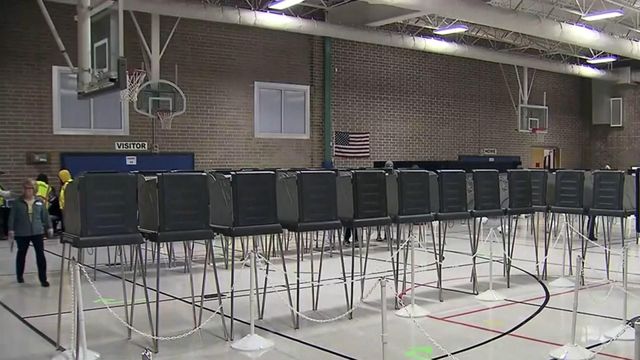GOP leaders decry state warning against uniformed law enforcement at NC polls
A chorus of state Republican leaders on Tuesday accused Gov. Roy Cooper's administration of being anti-police after the state elections chief said uniformed police shouldn't be stationed at polling places during early voting or on Election Day.
Posted — UpdatedBrinson Bell advised county officials to meet with local law enforcement about security concerns and election laws, but she said uniformed law enforcement officers should not be stationed at polling sites.
Republicans accused her and Cooper's administration – she was hired by the Democratic-controlled State Board of Elections – of being anti-police and "appeasing the radical left."
"This memo is insulting to the men and women in uniform and raises troubling questions about why the governor does not want security on site at polling places, where many will be gathered exercising their constitutional rights," Lt. Gov. Dan Forest said in a statement.
"Gov. Cooper's Board of Elections is not a law enforcement agency and has no authority to direct police action. The board must rescind yet another lawless memorandum that undermines election security," Sens. Ralph Hise, R-Mitchell, Warren Daniel, R-Burke, and Paul Newton, R-Cabarrus, who co-chair the Senate Elections Committee, said in a statement.
Tm Wigginton, spokesman for the North Carolina Republican Party, said the board "claims without any evidence that voters find a law enforcement presence at the polls intimidating.”
"The safety of voters and elections officials is a top priority. At the same time, you must remain cognizant that some voters may feel intimidated by the presence of law enforcement at the polls," Strach wrote in an Oct. 26, 2018, memo.
In November 1920, police across Florida beat and killed Black men and women for voting in that year’s election. In the 1950s and 1960s, police across the South beat and arrested Black people who voted and the organizers who helped them register to vote.
Black voters today remember those episodes when they see uniformed police at voting sites, she said.
"They don’t seem to be agents of peace or law and order. They seem to be instruments of domination," she said of uniformed officers.
North Carolina Attorney General Josh Stein said Trump's suggestion that his supporters go check who's voting is illegal. State law allows trained and pre-approved election observers from both parties – not members of the general public – to watch in voting areas.
"You have a right to go in there, to go into the early voting location in order to vote," Stein said. "You have no right to go in there to observe, comment or question any other North Carolinian and their right to vote."
Campaigning for a candidate or a party, such as handing out fliers or holding signs, is allowed near voting sites, as long as it's done outside a 50-foot buffer zone. But Stein said harassment or intimidation of voters is strictly illegal and can lead to fines or even prison time.
"If they question you about, 'Are you a citizen?' [or] they question your language, if they try to block or impede your path to the voting area, if they yell at you in a hostile manner, any of that would form intimidation," he said.
Early voting starts Thursday across North Carolina and runs through Oct. 31. Election Day is Nov. 3.
• Credits
Copyright 2024 by Capitol Broadcasting Company. All rights reserved. This material may not be published, broadcast, rewritten or redistributed.




